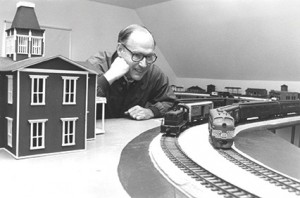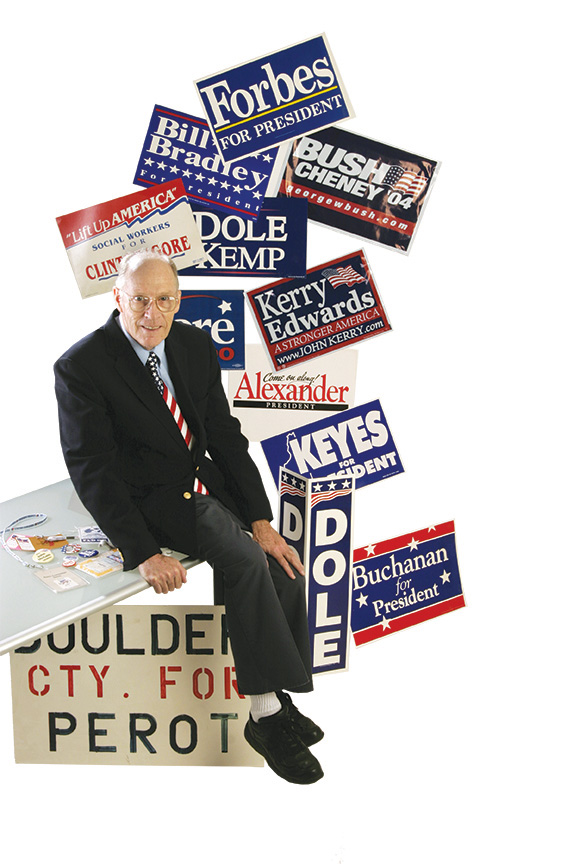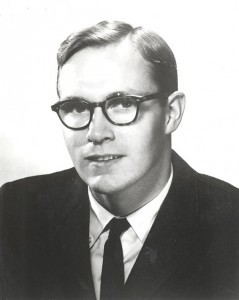Retired Professor Still Making a Difference in the World
The year was 1968, a time of great change in this country. Headlines screamed news of protests and assassinations, and tensions were high between black and white, young and old, doves and hawks.
It also was a year of change for a 30-something young man heading west to Colorado College. Robert Loevy’s resume included a Ph.D. in political science from Johns Hopkins University, two years on Capitol Hill as a legislative assistant, and a stint covering politics and civil rights for the Baltimore News-American newspaper.
“Martin Luther King was assassinated the week before I came out here to interview for my job,” Loevy recalled. “And I came out from Baltimore with a reputation as an urbanologist. I got questioned very carefully because the previous week, Baltimore was occupied by federal troops ordered out by President Johnson because of the riots. With my background of having observed and written about the civil rights movement, my expertise was in urban problems at the time. Perfect guy for the moment.”
That “moment” lasted 42 years.
In January 2015, Loevy was in his office in the North Weber Street building set aside for retired CC professors. His body is challenged by the progressive muscular disease that drove him out of teaching, but his mind is still abuzz with ideas. His desk was covered with printouts of works in progress and the finished products — 16 books and counting.
Loevy didn’t expect to become a professor when he started working on his doctorate. He found his calling while student teaching at Johns Hopkins’ night school, where his students ranged in age from 18 to 60. He was teaching American politics and state and local government politics “at a time when America’s cities, to use John F. Kennedy’s words, were ‘fires of discord.’ That’s where I got my love for teaching.”
He briefly taught at Goucher College in Baltimore before making the leap to CC.
“After about two months at Colorado College, it just hit me that this place was quite different from any place I’d been before in its friendliness, its acceptance, the cooperation and social interaction among the faculty. I think, above all, the distinguishing atmosphere here is the fact that it’s student-centered. The college exists for the students.”
He’s seen a lot of change at the college, including the size and demographics of the student body — from about 1,600 with a male-to-female ratio of 2-to-1 in 1968 to just less than 2,000 with 53 percent female students.
However, he’s seen CC’s mission hold fast through the years.
“The thing that never changes is the commitment to liberal arts, the commitment to teaching, the commitment to smaller classes, the emphasis on faculty being readily available to students.”
But, he added, although the curriculum still includes Plato and Aristotle, it evolves as faculty members retire and new people arrive with fresh ideas.
“Doug Mertz, who was the chairman of political science and hired me, used to say, ‘We hire an athlete, not a sport.’ Stop to think about that. What he was saying was, ‘We don’t care if you teach basketball or soccer or lacrosse; we want you to be a good athlete in the sense that you’re a good teacher, you can take a body of material, make it interesting to the students.’
“Universities are famous for being very rigid with their younger faculty. ‘You’re going to teach American politics, you’re going to teach beginning philosophy.’ And we all know we have to teach these courses, but we’d like to spend some of our time teaching our specialty.”
During those 40-plus years, of course, Loevy has seen huge changes in politics, some of which disheartens him.
“The most discouraging thing happening in the world today is the repeated, widespread, happens-so-frequently-we’re-almost-used-to-it, killing of innocent people for political purposes.”
He’s studied the South’s shift from Democratic segregationists to Republicans, which has led to a polarization much more pronounced than what he studied in graduate school.
“All we talked about then was the accommodating Congress and how the Democrats worked together with the Republicans, and reformers accused the two parties of being Tweedledee and Tweedledum. The parties were not sharply defined at all, let alone sharply defined against each other the way they are at the moment. And of course, the major change has been in the rise of minorities in all levels of government, and I include women in that. But the major social changes were the civil rights acts in the ’60s and the women’s rights movement of the ’70s.”
He’s optimistic about the future of humanity, especially when he compares ongoing conflicts around the planet with the cataclysms of the world wars.
“Although we’ve just been through a worldwide recession and the world’s economy isn’t coming back the way we’d like, the fact of the matter is, since the end of World War II, the improvement in lives over those years has been quite significant. We still have the problem that the developed nations get further ahead of the undeveloped nations, and so we have these immigration problems. They’re problems of success. People want to come to the U.S. and Europe because that’s where the good money can be made, that’s where the good life can be found.”
Soon after he retired from full-time teaching in 2010, Loevy was tapped for Colorado’s Reapportionment Commission, which meets every 10 years to reconfigure boundaries for state Senate and House seats using the U.S. Census.
“It was one of those ‘as long as you don’t say anything atrocious, you’ll get the job’ type of interviews,” he said. “So I didn’t say anything atrocious to the chief justice of the Colorado Supreme Court. He looked at me with a wry smile you can only get from a judge and said, ‘This is the perfect thing for a retiring college professor.’ And he was right.”
Loevy enjoyed touring Colorado with his fellow commissioners from May to November 2011, meeting with residents off the usual political path. He garnered enough material for a book called “Confessions of a Reapportionment Commissioner,” which is available online. It stirred controversy with his pronouncement that the amendment which created the commission was a “total failure.”
Tom Cronin, Loevy’s frequent writing partner, joined CC’s Political Science Department in 1979 and soon realized he’d found a mentor.
“Bob was a font of information about how things worked in Colorado Springs government and the city, county, and state politics,” the Massachusetts native said. “Then, I was invited to write a book about Colorado and I was reluctant to do that. But I asked him if he would collaborate with me, because he had so much knowledge. We commissioned state-wide polls, and we interviewed former governors, Supreme Court justices, and dozens of lobbyists and legislators.”
Although Cronin “leans toward” the Democratic Party and Loevy is more closely aligned with Republicans, they agree 99.8 percent of the time, Cronin said.
They’re in demand for television and radio interviews, and The Denver Post often features their views on its Opinion pages. They’ll meet for a meal, kicking ideas back and forth to refine them; then one will write a draft and the other will edit it.
“He’s very good at editing my work,” Cronin said. “He makes sense of stuff. I’ll draft a piece and send it to him and he’s great at editing, adding, and clarifying. I’ve done hundreds of journalistic pieces over the years, but I was never a full-time reporter. He has a great sense of humor, and if he disagrees with you, he does it politely. Sometimes, when you co-author or co-edit someone’s work, it can be a knock-down-drag-out fight.”
Cronin said Loevy’s students always felt welcome in his office, where they talked about political campaigns they’d worked on or hoped to be involved in.

Robert Loevy put together this large model train set in his attic. When their children were young, he and his wife would invite CC parents to bring their children to watch the trains at Christmas time. Those children, now grown, occasionally stop by with their kids to continue the tradition.
Robert Lackner ’81 took a class called Political Parties and Voting Behavior in 1978-79 and found that prepared him for his work as a senior attorney for the Colorado General Assembly.
“It’s on a short list of the best classes I have ever taken at any level of education from kindergarten through ‘adult ed.’ I have been in and around politics and politicians for most of my professional life and no class taught me more about how politics works in the real world, ” Lackner said.
“As with so many great teachers at CC, Professor Loevy encouraged us to think independently and to develop our own views. In fact, in having us read both Hunter Thompson’s and Teddy White’s accounts of the same presidential election [in 1972], he encouraged us to overcome the simplistic assumption that there is even necessarily one objectively accurate way to interpret political phenomena.”
Nina DeConcini ’85, now a senior manager for Oregon’s Department of Environmental Quality, also loved Loevy’s Political Parties and Voting Behavior class.
“It was smack in the middle of the primary election season so every day we were discussing what was happening at the moment. . . . I loved the rough and tumble of it all, how he challenged each of us to think for ourselves and his encouragement as we debated in his slow, dry humor way.
“Among the things I learned about life in his classes was how to be civil even if you disagree with someone. No surprise: He and I were, and perhaps still are, at opposite ends of the political spectrum. He had a very regal air about him without being haughty or imperious. He took me seriously and respected my intelligence,” DeConcini said.
Even when he was busy teaching, Loevy welcomed inquiries from newspaper and television reporters needing his wisdom and perspective about Colorado politics — and he’s still being asked.
“A lot of us get busy and selfish with our time and have to say no to all these requests, which after a while become a burden. But Bob never felt that way; it was part of his teaching role,” Cronin said.
“What makes Bob Loevy exceptional is that he is a stalwart classroom teacher, a stalwart citizen of the college, and a stalwart citizen of his neighborhood, city, and state,” Cronin said. “It’s rare that you get a combination of a person who is such a dedicated and gifted teacher, dedicated and gifted writer and scholar, and also makes the time to be a citizen at large, generously giving advice and leadership to his neighborhood, the community, and the state.”
A resident of Colorado Springs’ Old North End, Loevy has been a valuable advocate for the neighborhood and, in 2010, co-wrote a book about its history and architecture.
His current writing passion is a biography of his great-great-grandfather, Archibald Williams, who roomed with Abraham Lincoln while they served in the Illinois Legislature. Lincoln wrote two letters to Williams and mentioned him in approximately 10 other letters, Loevy said.
“When Lincoln was elected president, my great-great-grandfather was in his 60s and I suspect he may have had tuberculosis. Anyway, Lincoln offered him the Supreme Court and he said, ‘No, I won’t be there that long; you’ve got to appoint a younger man.’ ”
Loevy has traveled to Illinois to research the biography and gather images; he plans to publish the book online in mid-2015.
In the meantime, Loevy revels in his grandchildren, who range in age from his daughter’s baby in Portland, Oregon, to his son’s 18-year-old; the six oldest live in Colorado Springs, so he sees them often. He also goes on adventures with his son.
“We like to shoot videos of special trains and private railroad cars. My best leisure time activities are when we’ll load the video cameras in the car. We particularly like to chase circus trains.”
A stalwart and passionate teacher, mentor, colleague, adviser, citizen, friend, neighbor, father, grandfather, and train enthusiast — taken all together, a life well-lived.
The Facts
- Loevy: rhymes with “navy”
- Born Feb. 26, 1935, in St. Louis, Missouri
- Earned bachelor’s degree in 1957 from Williams College, Williamstown, Massachusetts
- Earned Ph.D. in 1963 from Johns Hopkins University, Baltimore
- Joined the Colorado College faculty in 1968
- Shared the Gresham Riley Award in 1999 with Donald Jenkins and Richard Beidleman
- Retired from full-time teaching in 2010 and fully retired in 2014
- Family: Wife, Constance, died 2006. One son, one daughter, and seven grandchildren

